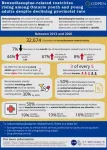(Press-News.org) Chronic diseases (NCDs) are a global health epidemic and almost 80% of them occur in low- and middle-income countries. While the WHO have developed policies to combat chronic diseases, research shows that, in certain regions, they are not having the desired effect, leaving fragile health systems increasingly overwhelmed. In order to combat this, thanks to a Horizon Europe grant, Amsterdam UMC is set to lead a global consortium with the aim of developing interventions that work in practice.
Consortium leader and Professor of Global Migration, Ethnicity and Health at Amsterdam UMC, Charles Agyemang notes that, "We see particularly in sub-Saharan Africa that the rates of chronic diseases are rapidly rising that, crucially, the WHO measures are not working as well as they need to. Partly because most of the data for these interventions were gathered in high-income countries. This means that the development of a new arsenal of interventions is essential.”
With an eye on developing targeted interventions that will make the most difference, the consortium will aim their sights on those aged between 10 and 24. Partly due to the fact that this group receives less attention in the current WHO policies and, crucially, also because of the role that this period of live plays in behavioural development. "Chronic diseases are often caused by behaviours that begin early in life including eating unhealthily, not exercising enough, so for that reason we're going to target precisely this group," adds Agyemang
Multi-faceted approach
The consortium consists of partners in France, Belgium and the United Kingdom as well as African partner universities and research institutions in both Kenya and Ghana. The goal is to develop interventions that work in three settings: secondary schools, family/faith-based settings and on social media.
Professor of Public Health Nutrition at the University of Ghana, Amos Laar, who is a co-investigator notes that “combating a very complex epidemic such as NCDs will require multi-component intervention concurrently targeting its multiple risk factors, involving multiple live stages, delivered via multiple platforms, and meaningfully and sufficiently engaging with multiple stakeholders. That is exactly what project seeks to do”.
Across sub-Saharan Africa it is estimated, by the World Bank, that almost 50% of children are not in school and therefore it is necessary for interventions to look beyond the classroom or the dining hall. Agyemang believes that this multi-faceted approach "will increase the motivation of young people to eat healthier and be more physically active" and crucially "will increase the chance of lasting changes''
Something which, Dr Gershim Asiki, a co-investigator and Head of NCDs Unit in the African Population Health Research Centre in Kenya also emphasises: ‘’the project embraces principles of co-design throughout the proposal development and implementation and a highly consultative process that will promote uptake and sustainability of the program.”
END
Amsterdam UMC to lead global hunt for new interventions in the battle against unhealthy behavior
Thanks to a Horizon Grant worth three million euros, Amsterdam UMC wil work with partners in France, Belgium, the United Kingdom, Kenya and Ghana
2023-06-15
ELSE PRESS RELEASES FROM THIS DATE:
A ‘pinch’ of mineral salts helps the noncaloric sweeteners go down
2023-06-15
Perfect noncaloric replacements for sugar and high fructose corn syrup just don’t exist yet. For example, some alternatives have a lingering sweet aftertaste and lack a sugar-like mouthfeel, leaving consumers unsatisfied. Now, researchers in ACS’ Journal of Agricultural and Food Chemistry propose adding blends of nutritionally important mineral salts to make noncaloric sweeteners seem more like the real thing. Taste-testers indicated that these blends gave zero- and low-calorie drinks a better ...
New tracking device to keep better tabs on wolves
2023-06-15
Keeping up with the journeys of wolves and welfare of wild horses has never been easier. With a GPS wildlife tracker powered by an animal's own movements, University of Copenhagen researchers have solved a problem faced by biologists and wildlife managers seeking to track wild animals year after year: dead batteries.
The wolf’s comeback in Europe has preoccupied people all across the continent over the last years. Where is it? What is its range? What does it live on? The only way to get solid answers to these questions is through GPS tracking. In ...
Nearly 1 in 3 Black adults may develop PAD; disparities in care increase amputation risk
2023-06-15
Statement Highlights:
Nearly 1 in 3 Black adults may develop peripheral artery disease (PAD), compared to about 1 in 5 Hispanic or white adults. If amputation is necessary for treatment, Black, Hispanic and American Indian adults experience lower survival rates and worse quality of life after amputation compared to white adults.
Multiple social, economic and health variables contribute to disparities by sex, race and ethnicity in the development, diagnosis and treatment of PAD.
Opportunities to address disparities include greater focus on prevention in health care systems, ...
Mapping the evolution of E. coli’s main virulence factor offers a refined drug target
2023-06-15
This new work focused on a particular subset of E. coli with a specific capsule - the extracellular barrier that surrounds a bacterium - which scientists have called K1. E. coli with this type of capsule are known to cause invasive diseases such as bloodstream or kidney infections, and meningitis in newborns. This is because this particular cover allows them to mimic molecules already present in human tissues and enter the body unnoticed.
The researchers present evidence that targeting the capsule can be used ...
Only 30% of show horse owners surveyed in Australia agreed with facial hair trimming ban, new study reveals
2023-06-15
New research published in the CABI journal Human-Animal Interactions has revealed that only 30% of show horse owners surveyed in Australia agreed with a ban on the trimming of facial hair prior to its implementation in July 2022.
The research found that when asked if facial hair trimming should be banned in all equine competitions, most disciplines broadly agreed (60.5% to 84.6%) apart from showing with only 22.9% of respondents agreeing with a ban.
Indeed, some who took part in the research also believed that horses did ...
Chronic wound healing using glass
2023-06-15
Researchers at the University of Birmingham have demonstrated that silver retains antimicrobial activity for longer when it is impregnated into ‘bioactive glass’, and shown for the first time how this promising combination delivers more long-lasting antimicrobial wound protection than conventional alternatives.
Bioactive glasses are a unique class of synthetic biomaterials made from silicone and have been used for some years in bone grafting.
Silver has long been known to prevent or reduce the growth ...
Finding out you’re autistic in later life can be a positive experience
2023-06-15
Receiving an autism diagnosis in your 20, 30s, 40s, 50s or even 60s may seem daunting, but a new study from psychologists in Bath and London finds that the link between the age at which someone gets diagnosed has little bearing on their quality of life.
So-called ‘late diagnosis’ for autism has hit the headlines recently thanks to autism campaigner Christine McGuiness. Whereas autism is usually diagnosed in childhood, it is increasing being diagnosed in adults and especially among women.
Parents often wonder if their child finding out they are autistic earlier or later will have an impact on their lives in the long term. Whilst many people who discover they are autistic as adults ...
Rising rates of benzodiazepine toxicity among young people spark concern
2023-06-15
Toronto, ON, June 15, 2023 – The rate of hospital encounters for benzodiazepine-related toxicity rose by 67 per cent for young adults (aged 19 to 24) and 44 per cent for youth (aged 18 or below) in Ontario between 2013 and 2020, according to a new study from ICES and Unity Health Toronto.
Though there was an overall decline of 7 per cent in the provincial rate of benzodiazepine toxicity, this was largely driven by reductions in rates among people aged 35 years and older.
Benzodiazepines are commonly prescribed to treat anxiety ...
How antelopes under threat from the climate crisis have responded to rising temperatures
2023-06-15
The climate crisis is turning the temperature up all over the world, but in southern Africa, the rise has been particularly concerning. Wild animals dependent on delicate ecosystems which are already dry, so that food and water scarcity limits their ability to cope with increased heat, are at serious risk. Scientists studied the behavior of three different species of antelope with overlapping ranges in Namibia to try to understand how animals of different sizes and behaviors adapt to the heat.
“Even the indigenous wildlife, adapted to hot and arid conditions, shows sensitivity to extreme heat,” said Paul Berry of the University of Potsdam, lead author of the study in ...
Dialogues across language and culture
2023-06-15
Teacher talk seems intuitive – the expert imparts knowledge onto novices, who passively receive expertise like a car or machine receives parts at every station on an assembly line. In reality, an effective teacher in an era of dynamic and higher literacies is less of a factory worker and more of an active negotiator who tries to understand where their students are coming from in order to reach them. The language classroom amplifies this challenge where the negotiation not only centers on the knowledge itself but the means of communication for that knowledge. ...
LAST 30 PRESS RELEASES:
Mayo Clinic installs first magnetic nanoparticle hyperthermia system for cancer research in the US
Calibr-Skaggs and Kainomyx launch collaboration to pioneer novel malaria treatments
JAX-NYSCF Collaborative and GSK announce collaboration to advance translational models for neurodegenerative disease research
Classifying pediatric brain tumors by liquid biopsy using artificial intelligence
Insilico Medicine initiates AI driven collaboration with leading global cancer center to identify novel targets for gastroesophageal cancers
Immunotherapy plus chemotherapy before surgery shows promise for pancreatic cancer
A “smart fluid” you can reconfigure with temperature
New research suggests myopia is driven by how we use our eyes indoors
Scientists develop first-of-its-kind antibody to block Epstein Barr virus
With the right prompts, AI chatbots analyze big data accurately
Leisure-time physical activity and cancer mortality among cancer survivors
Chronic kidney disease severity and risk of cognitive impairment
Research highlights from the first Multidisciplinary Radiopharmaceutical Therapy Symposium
New guidelines from NCCN detail fundamental differences in cancer in children compared to adults
Four NYU faculty win Sloan Foundation research fellowships
Personal perception of body movement changes when using robotic prosthetics
Study shows brain responses to wildlife images can forecast online engagement — and could help conservation messaging
Extreme heat and drought at flowering could put future wheat harvests at risk
Harlequin ichthyosis: a comprehensive review of pathogenesis, diagnosis, and management
Smithsonian planetary scientists discover recent tectonic activity on the Moon
Government censorship of Chinese chatbots
Incorporating a robotic leg into one’s body image
Brain imaging reveals how wildlife photos open donor wallets
Wiley to expand Advanced Portfolio
Invisible battery parts finally seen with pioneering technique
Tropical forests generate rainfall worth billions, study finds
A yeast enzyme helps human cells overcome mitochondrial defects
Bacteria frozen in ancient underground ice cave found to be resistant against 10 modern antibiotics
Rhododendron-derived drugs now made by bacteria
Admissions for child maltreatment decreased during first phase of COVID-19 pandemic, but ICU admissions increased later
[Press-News.org] Amsterdam UMC to lead global hunt for new interventions in the battle against unhealthy behaviorThanks to a Horizon Grant worth three million euros, Amsterdam UMC wil work with partners in France, Belgium, the United Kingdom, Kenya and Ghana

